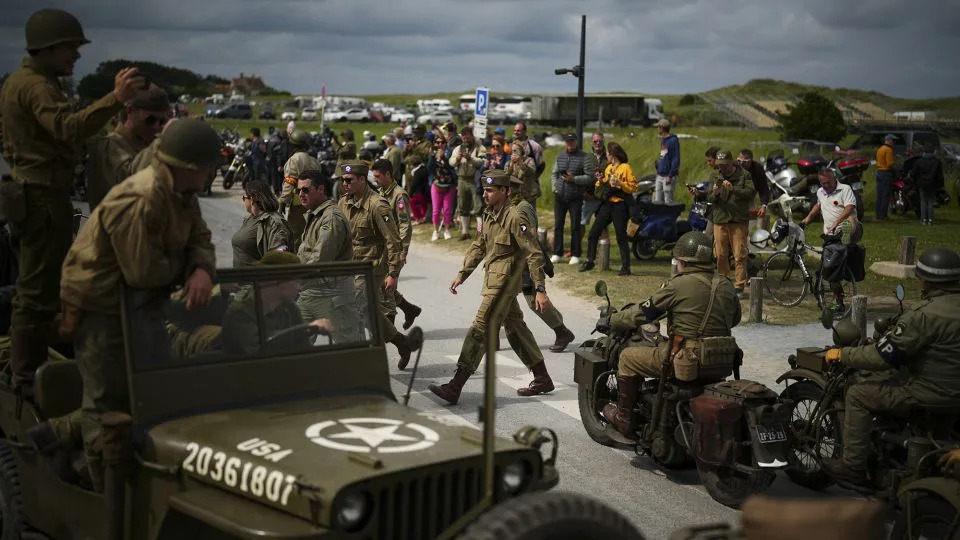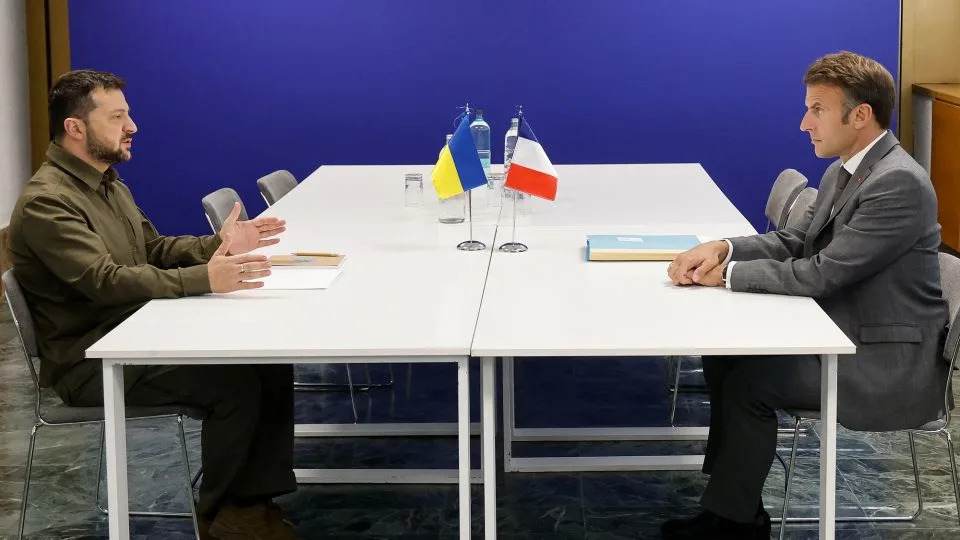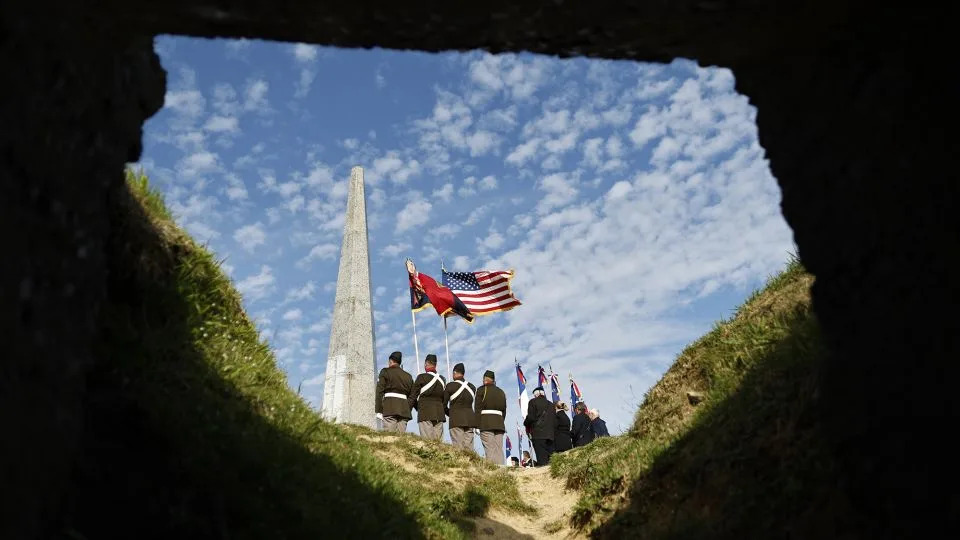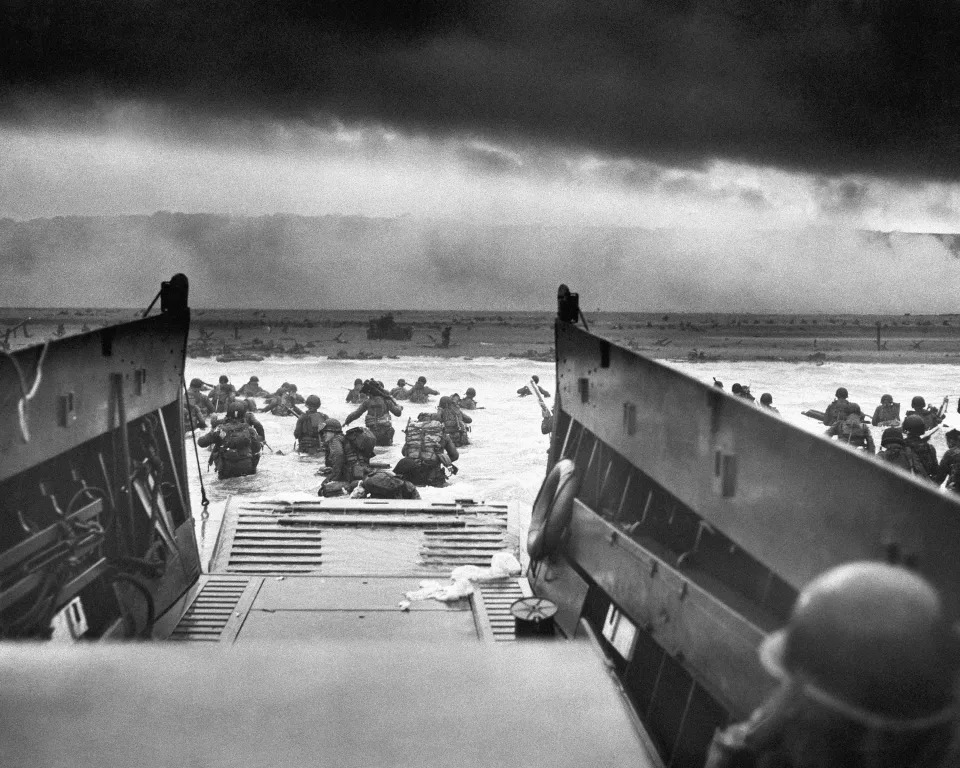Parachutes flapped open in midair over France on Sunday as US paratroopers leaped out of World War II-era military planes, launching the start of a week of solemn commemorations marking the 80th anniversary of D-Day, a week that will bring dozens of world leaders, including President Joe Biden, for events that will be rich in symbolism and resonant with current times.
For decades, the United States, its allies and others have come together to remember the June 6, 1944, US-led landing in Normandy, the largest seaborne invasion in history and the pivotal final stage of the Allied push to defeat Nazi Germany’s devastating, genocidal campaign of conquest.
The ceremonies, as is tradition, honor those who fought and died in World War II, and reaffirm a commitment to learn the lessons of history. But what exactly are those lessons, and how exactly will world leaders turn that commitment into reality?
That nebulous pledge to prevent history from repeating itself has become starkly concrete as Russian forces seek to subjugate Ukraine in the first major land war in Europe since World War II.
And in a remarkable twist, history also echoes in the possibly next president of the United States, Donald Trump, who has revived the term “America First,” used in the 1930s and ’40s by Americans who wanted the US to stand back, even as Hitler launched a war to conquer Europe.
As he foreshadows potentially drastic changes in the US approach to Europe’s defense and to the war in Ukraine, Trump is raising “existential” anxiety among US allies.
AfriPrime App link: FREE to download...
https://www.amazon.com/Africircle-AfriPrime/dp/B0D2M3F2JT

In France this week, Biden will join some 25 prime ministers and presidents — Ukrainian President Volodymyr Zelensky will attend; Russia’s Vladimir Putin has not been invited — marking the occasion. Biden will then travel to Paris for a state visit.
During his time in France, he will speak “about the importance of defending freedom and democracy,” and discuss “a wide range of global challenges.”
Topping the agenda: how to help Ukraine.
The host, French President Emmanuel Macron, has emerged as one of the most outspoken advocates of upgrading support for Kyiv, contrasting with Biden’s assertive but more cautious approach.
Macron’s transformation has been remarkable. In the weeks leading up to Russia’s unprovoked full-scale invasion of its neighbor, he traveled to Moscow, meeting with Putin at his colossally long Covid-19-distancing table, in search of a way to prevent the conflagration.
Those who thought Macron was being too deferential to the Russian dictator had extra reason to cringe when, months after Russian forces crossed into Ukraine, Macron declared that “we must not humiliate Russia.” And all as Russia’s plan to score a swift victory was unraveling and Biden was reaffirming his unwavering support for Kyiv.
In the intervening years, Macron’s stance has hardened as his view of the risk Russia poses to Europe and the West has darkened. In April, he warned, “Our Europe is mortal; it can die,” partly as a result of Russia’s aggression.
Earlier this year, he jolted Europeans when he declared that nothing can be ruled out, not even sending Western troops to Ukraine, adding “We will do anything we can to prevent Russia from winning.”
Germany rejected the idea, as did others. But apparently Macron was doing more than trying to stiffen allies’ spines.
AfriPrime App link: FREE to download...
https://www.amazon.com/Africircle-AfriPrime/dp/B0D2M3F2JT

According to the Financial Times, this week, with Biden and Zelensky in France, Macron will announce that European troops will, in fact, soon go to Ukraine.
One of the most pressing decisions faced by Ukraine’s backers now is how much freedom to give Kyiv to strike Russian targets with the weapons they provide.
The dilemma embodies one of the two fears driving Western support. On one hand, Europe and the United States fear that if Russia wins, Putin will continue pushing to conquer territories that belonged not just to the Soviet Union but also to the Russian Empire.
That’s a concern searingly underscored by the lessons of World War II, when Hitler was allowed to slice off a piece of Czechoslovakia, then moved into Poland and barreled across Europe until he was finally stopped.
The worry is palpable among Russia’s neighbors and is one of the reasons Polish Prime Minister Donald Tusk has told his people to prepare, calling this time a “prewar era.”
On the other hand, the fear is that giving Ukraine carte blanche to strike at Russia risks escalating the conflict into one between nuclear-armed Russia and nuclear-armed NATO, perhaps World War III.
Can the war be contained and Russia defeated?
Zelensky has been imploring Kyiv’s friends to let Ukraine use their arms to strike inside Russia. While allies discussed the issue, Russian forces, facing little risk, struck a department store in Kharkiv, not far from the Russian border, killing 18 people.
“Please give us the permission” to use the weapons for preventing those attacks, Zelensky implored allies. He won’t use them without permission, for fear of losing Western support.

The West remains divided on the issue. Biden has loosened some of the restrictions. Macron and German Chancellor Olaf Scholz want them loosened even more, though still restricted. Finland and NATO Secretary General Jens Stoltenberg say Ukraine’s friends are forcing it to fight with one hand tied behind its back.
The D-Day anniversary meetings are sure to include discussions about how to stop Russia, and the question of whether Russia, if facing a more empowered Ukraine, would really face off directly with the West, as Putin threatens.
As they gaze on the once blood-drenched beaches of Normandy, world leaders should consider the lessons of World War II, and how to apply them today.
America Firsters helped persuade the United States to stay out of combat in Europe until the war came to the US at Pearl Harbor. Eventually, 16.4 million Americans served in the military during World War II, more than 10% of the population. Some 29,000 Americans died in the Normandy invasion, in a war that engulfed 50 countries, a catastrophe that would kill more than 70 million people, one of every 30 people who were alive when it started.
The conflicts are not the same; the ideologies and the leaders are different. And yet, the beaches of Normandy resonate with the lessons of that terrible history; world leaders should listen closely.
AfriPrime App link: FREE to download...
https://www.amazon.com/Africircle-AfriPrime/dp/B0D2M3F2JT
D-Day's 80th anniversary brings World War II veterans back to the beaches of Normandy
World War II veterans are joining heads of state and others Thursday on the beaches of Normandy to commemorate the 80th anniversary of D-Day.
The Allied invasion, which began on June 6, 1944, led to the defeat of the Nazis and the end of the war. The assault began with Allied aircraft bombing German defenses in Normandy, followed by around 1,200 aircraft that carried airborne troops. As dawn broke, Allied forces started bombing German coastal defenses and shortly after that vessels began putting troops ashore on five codenamed beaches: Utah, Omaha, Gold, Juno and Sword. By the end of the day, nearly 160,000 Allied troops had landed in Normandy, although there were thousands of casualties.
Few witnesses to history’s biggest amphibious invasion remain alive today.
‘WE JUST HAVE TO REMEMBER THE SACRIFICES’
UTAH BEACH, France — As the golden sun pierced low clouds over the seas that were thick with landing craft approaching Normandy on D-Day, Becky Kraubetz peered across the English Channel toward her native Britain, her eyes filled with tears as she thought about the scene 80 years ago.
“It’s so historic and we just have to remember the sacrifices of everybody who gave us our freedom,” said Kraubetz, whose grandfather served with the British Army during World War II and was captured in Malta.
“It gives you goosebumps, everything that happened here. Imagine just jumping into the water, freezing cold,” said the 54-year-old who now lives in Florida, as the rays of the morning sun started to warm the hundreds of people who’d waited through the night’s chill for dawn’s break.
“The bravery, the courage, for people to face that is just unbelievable — very, very humbled to be here.”
THE SUN RISES OVER NORMANDY BEACHES AS THE WORLD REMEMBERS D-DAY
UTAH BEACH, France — As the sun sets on the D-Day generation, it’s rising again over Normandy beaches where soldiers fought and died exactly 80 years ago, kicking off intense anniversary commemorations Thursday against the backdrop of renewed war in Europe, in Ukraine.
Ever-dwindling numbers of World War II veterans, and Russia’s full-scale invasion of Ukraine, make this anniversary particularly meaningful, mixing poignant remembrances for D-Day sacrifices with an Allied show of solidarity for Ukrainian President Volodymyr Zelenskyy, among the guests.
But host France hasn’t invited World War II ally Russia, citing its “war of aggression against Ukraine that has intensified in recent weeks.”
HUNDREDS GATHER AT DAWN AT UTAH BEACH TO MARK D-DAY'S 80TH ANNIVERSARY
UTAH BEACH, France — Hundreds of people, some in WWII-era uniforms, arrived before dawn to stretch out across the now peaceful sands of Utah Beach, one of the five Allied landing zones on D-Day where troops waded into cold seas through hails of fire exactly 80 years ago.
“It’s our way of paying homage, and better understanding what really happened in the 1944 landings,” said Dimitri Picot, a 33-year-old from the nearby Normandy town of Carentan who works as a rat and pest catcher.
Picot said he often dives on a wrecked ship that was hit and exploded, its wreckage visible Thursday as night gave way to day. Growing up amid the June 6, 1944, landing zones, he said he has become accustomed to seeing walls still pockmarked by bullets, shrapnel and other reminders of that fateful day.
But on the 80th anniversary “to think that they liberated us” hammered home the emotion, he said.
AfriPrime App link: FREE to download...



